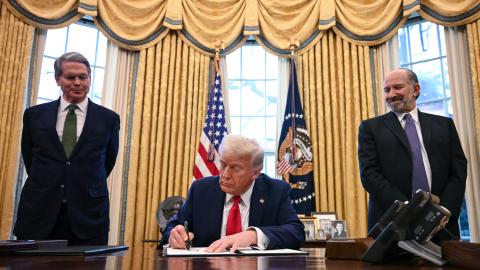Take heart. There is more going on than meets the naked ear. Yes, the mud-slinging contest that has replaced serious policy-making in Washington continues, with President Barack Obama the clear winner last week when he told a nationally televised press conference that House Republicans "have suspicions about whether government should make sure that kids in poverty are getting enough to eat..."
This assessment of the motives of those who want to cut spending came while the capital was preparing for tomorrow's second inauguration of Obama. No search for comity just yet.
The Republicans continue to say they will not raise the debt ceiling, or fund the government, unless the president agrees to cut spending as part of a programme to bring the $1 trillion annual deficit under control. "It is possible that we would shut down the government to make sure President Obama understands that we're serious," said Cathy McMorris Rodgers, who chairs the House Republican conference.
So much for threats by Republicans and what Pulitzer-winning columnist Charles Krauthammer characterised as "essentially a libel" by Obama. This is what passes for negotiation in Washington. As for the likelihood of a plunge off yet another fiscal cliff, a more realistic appraisal is that this is unlikely.
The president has been saying that he is willing to consider some reductions in entitlements, perhaps by changing the social security (pension) cost-of-living escalator and introducing means-testing of healthcare and other benefits. And important Republicans, plus the party's business supporters, have launched an effort to persuade Tea Party members and other House Republicans that use of the nuclear weapon--shutting down the government, completely or in part--might do considerable harm to the party's ability to win congressional seats in 2014 and the White House in 2016.
House Republicans gathered at the end of the week in Williamsburg, Virginia--where Ronald Reagan played host to Margaret Thatcher at the G7 summit in 1983--to plan tactics for the coming showdowns with Obama. The proverbial reliable source tells me that they know "they have to get through this patch" without the intra-party brawl that the president is attempting to provoke, and that "default is a bad fight to have."
The sequester battle, by contrast, is "a good fight to have." Discretionary spending, at $1.35 trillion a year, constitutes about one-third of total spending. Unlike entitlements such as social security and Medicare, discretionary spending, which includes everything from the military to maintenance of the Capitol, must be funded every year by Congress, with presidential approval. If no deal is reached, the sequester takes effect, cutting about 8%-9%, or some $100bn, from discretionary spending.
"Museums might have to close one day each week, and government agencies get by on less than they are accustomed to, but that might not be a tragedy and is an opportunity to see if these agencies can indeed do with less," my source tells me Republicans are thinking. That would pain conservatives who feel the military is already devoid of "fat," but might be better for the nation than no spending cuts at all.
The combination of a sequester, the recent 2% increase in payroll taxes ($20 a week from the average pay cheque), the Obamacare tax and other taxes on the wealthy will take about 2% out of GDP. Since the economy was forecast to grow at that rate or less in the first quarter, we will see zero, or slightly negative, growth early in the year.
But things are looking up for the latter part of the year. The manufacturing sector has got over its temporary hiccup and last month grew more than analysts expected, with upward revisions of the October and November pictures being frosting on the cake. Motor vehicle and parts production rose, as did output of computers and electronics. The housing sector continued on the upswing. In December, construction of single-family and multiple-family homes rose in every region and permits for future building showed gains. For 2012 as a whole, construction permits were up 30% and housing starts up 28% over 2011. Home prices continue to rise: the latest S&P/Case-Shiller home price index shows a 4.3% jump in October. And the banks seem in better shape than in recent years.
The employment market also improved last year, with about 2m new jobs, and at long last there was a decline in the number of workers unemployed for longer than six months. There are indications that the trend continued into the new year: home builders, oil and gas companies and high-tech industries are among those reporting difficulties in finding skilled workers.
Consumers, so far, remain unperturbed by the spectacle put on by Washington's gladiators. Retail sales were up in December, bringing the increase for the year to a more than respectable 5.2%. Unfortunately, it is difficult to predict whether consumers will continue to contribute to growth because of the cut in take-home pay caused by the payroll tax rise and higher taxes on families earning more than $450,000.
That might be part of the reason that official forecasters are being cautious or, as some prefer, impervious to signs of strength in the economy, including all the above, plus a resurgent energy sector and increased global competitiveness. The World Bank, as if setting out to prove that economists use decimal places to show they have a sense of humour, has raised its forecast for world growth in 2013 from 2.3% to 2.4%--it guessed 3% in June. It expects the US economy to expand at an annual rate of 1.9%, which is about 0.5 percentage points gloomier than the Federal Reserve Board.
My own view is that if the political air clears by March, a stronger economy will overwhelm remaining political weakness. After all, if winter comes, as it has, spring can't be far behind.

















